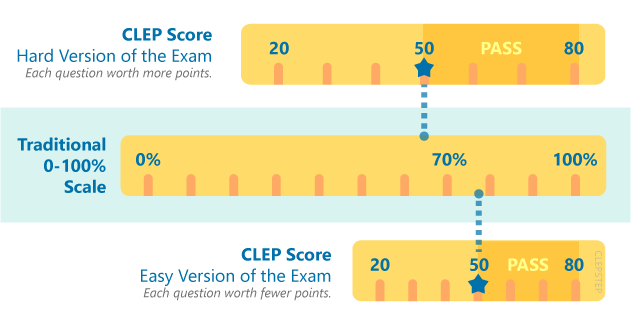
How hard are CLEP exams?
It’s all relative. Depending on your strengths and background, an exam that is difficult for most could be a breeze for you (or vice-versa). However, we can get a general idea of difficulty by reviewing last year’s pass rates for each exam.
How are CLEP exams scored?
CLEP has a wonky “scaled score” similar to the SATs. It’s not a 0-100 scale like typical tests. Rather, it uses a 20 – 80 scale, with a score of 50 as the recommended passing grade. The tricky part is that no one knows exactly what percentage is needed to pass. That’s because for each subject, there’s different versions of the test. Some are more difficult than others, and the easier versions are graded more harshly than the harder versions of the same subject’s exam.
Points are not deducted for incorrect answers. You receive points for correct answers.

What percentage do I need to get correct?
So here’s the scoop. No one really knows what percentage is needed to pass. You’ll never see your raw score on the front-end. This is because on the back-end, the point value of the questions is different for each person — based on the difficulty of the particular version of the exam you receive.
Got an easy version of the exam? You’ll need to get more questions correct to pass. You get a tough version? Your questions are worth more, and you’ll need fewer correct to pass.
What we do know is that College Board says that their recommended passing score of 50, is equivalent to C-level proficiency.
People speculate (emphasis on speculate) that anywhere between 60 – 70% may be needed to pass, but this will vary on how difficult your exam is. It’s best to just shoot for the higher percentage, and not risk wasting your time.
In my experience, I’ve always shot toward 70% or higher on practice exams. Using that standard, I’ve never had a problem passing the actual exam.
What is a passing score at my school?
When it comes to setting a “passing” score, most schools look to the American Council on Education (ACE) for recommendations. Each year, the organization reviews the content of CLEP exams, and determines what the recommended passing score is (and how many credits they think schools should award.) ACE typically recommends a score of “50” as the minimum to pass.
Many schools follow ACE’s recommendations, some set their own.
ACE guidelines do change on occasion. For example, last year the recommended credit value for Humanities dropped from 6 credits to 3. Unfortunately, cash-strapped schools don’t typically update their CLEP information in a timely fashion. That’s why it’s important to confirm credit values with your advisor before taking the exam.
Do CLEP exams transfer?
Just because your existing school accepted CLEP for credit, doesn’t mean your transfer school will recognize it the same way. When transferring, your new school will evaluate your scores independently, applying their own standards to determine whether you’ll receive credit, and what requirements the exam will fulfill.
How long should I study?
Everyone circumstance is different. Students report studying over the course of a few days, all the way up to a few months for a single exam. The best indicator of your readiness is your performance on practice exams. It’s helpful to get your hands on as many practice tests as possible. Once I hit 70% correct, I felt ready to proceed to the exam. Can you get away with less? Sure. Many people do. Whether you want to try cutting it close or not, is a decision you’ll have to make for yourself. For me, it’s not worth the risk.
Do all schools accept CLEP exams?
Many do, but several don’t. It’s important to contact your school for a list of what CLEP exams they accept, their minimum passing score, and credit equivalent for each.
The College Board website and your school’s website can both be decent indicators of whether they accept CLEP. However, go in with the knowledge that the published information is often out of date or incomplete.
What happens if I fail?
As of late 2018, the current re-test wait period is three (3) months. Schools may have their own policies that prohibit retesting, so it’s important to check with your university.
If I fail a class, can I take a CLEP instead?
Every school’s policy is different on this. However, many do not allow students to CLEP-out of a class they’ve previously failed. Some do.
Can I take CLEP exams online?
No. CLEP exams can only be taken in-person through official testing centers.
How will CLEP appear on my transcript?
Every school is different, but most apply CLEP similar to transfer credit. It will appear on your transcript, will carry credit, and will fulfill certain requirements, but it will not have a score or impact your GPA.
Will CLEP impact my GPA?
Most schools only list CLEP as pass/fail on the transcript. It carries credit, but doesn’t typically list a score or impact your GPA.
This is a good thing, and a bad thing. On the one hand, a passing score on the low end of the scale won’t negatively drop your GPA. On the other hand, if you take several CLEP exams, you now have to rely on a smaller number of courses to calculate your GPA — so a single low grade will have a greater impact.
Is there a maximum number of CLEP exams I can take?
It’s critically important that you check your school’s policies on this, as they’re all different. Some of the limitations I’ve seen include:
- Limits on the maximum number of CLEP credits.
- Limits on when you can take CLEP exams.
- Limits on whether you must be enrolled at the time of the exam.
What is the difference between the College Composition and College Composition Modular exams?
Don’t be surprised if advisors and testing centers don’t know the difference. The CLEP website is a bit unclear on this.
Simply put, the College Composition exam includes a multiple choice section, and a written essay section. The Modular typically only contains the multiple choice section.
Some schools weigh these two versions of the exam differently, so it’s important to check with your advisor before taking the exam.
Warnings to Keep in Mind
- All schools value CLEP differently (or not at all).
- Prior to taking the exam, credit values can change.
- Just because one school accepted it, doesn’t mean another will.
